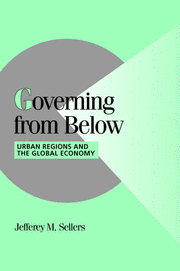3 - THE REAL WORLD OF DECENTRALIZATION
Published online by Cambridge University Press: 14 January 2010
Summary
Policy and its consequences pervade outcomes within cities. Whether through initiatives and incentives on behalf of urban economic development, political control in support of environmental protection or reinforcements of as well as constraints on spatial advantages and disadvantages, governments at higher levels have affected outcomes in all three domains. Yet mapping even these measures forward from above demonstrates how important the local influence on them has been. Politicians, businesspeople, activists and electorates within metropolitan settings often play as crucial a role as national, regional and supranational policy elites. Higher-level governments may finance vast expansions in physical infrastructure, education and research, but local initiatives often decide which places receive these assets. Higher-level governments may legislate protections on land, but local decisions determine what land is in fact protected. Higher-level officials may allocate funds for new public housing, but local choices can decide whether that housing will create ghettos. In all of these areas, and in urban regions across the advanced industrial world, localized decision making has proliferated even as policy making at higher levels has in many respects expanded.
What has become known as regulation theory has analyzed these actions as essentially the consequence of capitalist interests in economic production. Yet not only interests besides those of business but also institutional logics inherent in government and policy give shape to these policies. Beyond formal devolution from above, the localization of policy has also grown directly out of expanding state activity. The more that national, intermediate and transnational governments have tried to shape urban political economies, the more that governing from above has depended on governance from below.
- Type
- Chapter
- Information
- Governing from BelowUrban Regions and the Global Economy, pp. 90 - 177Publisher: Cambridge University PressPrint publication year: 2002

